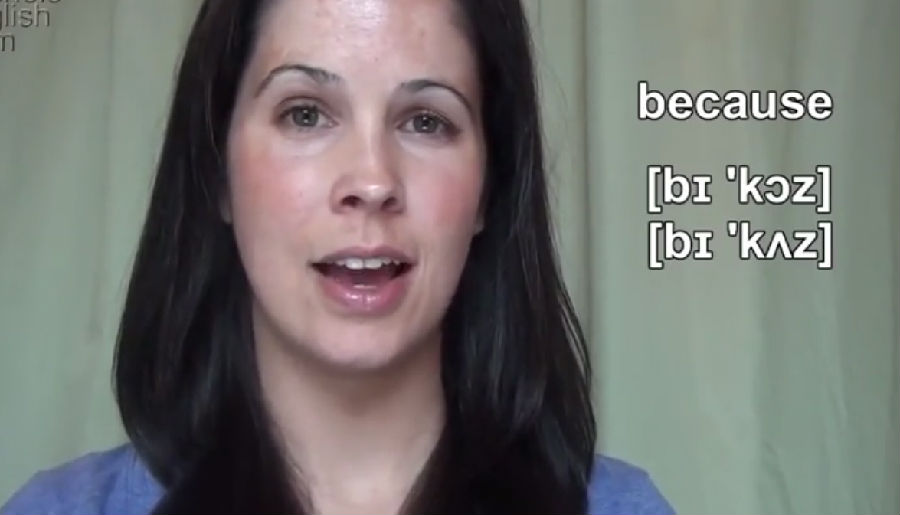(单词翻译:单击)
In this American English pronunciation video, we're going to discuss how to pronounce the word 'because' in everyday conversation.
在这节美式英语发音课,我们将要讨论日常对话中的“because”如何发音。
The word 'because' has a couple of different pronunciations. It can either have the AW vowel or the UH vowel in the second syllable.
单词“because”有两种不同的发音。第二个音节的元音既可以发成AW也可以发成UH。
But let's start at the beginning.
但是我们来从头看。
The first syllable is unstressed: be-, be- because. It begins with the B consonant sound, then the 'ih' as in 'sit' vowel.
第一个音节是非重读音节,be-,be- because。以辅音B开头,然后是“sit”中一样的元音“ih”。
The second syllable, stressed, which will be higher in pitch and longer than the first, begins with the K consonant sound.
第二个音节是重读音节,比第一个音节音调高且发音慢。开头是辅音K。
Then either the AW or the UH vowel, and finally, the Z sound.
然后是元音AW或者UH,最后是Z。
Now this is important, it's written with an S, so some people tend to pronounce it as an'S'.
这一点很重要,最后有个字母S,所以很多人会发成S的音。
But it is a Z sound, so it does need to be voiced: because, zz, zz, zz.
但是这是一个Z的音,所以应该这样发音:because,zz,zz,zz.
It will be a very quick final consonant, zz, zz, zz. but it does have to have the vocal cords engaged.
这是一个很快的结束辅音,zz,zz,zz。但是必须振动声带。
Because is a conjunction, which makes it a function word. And function words are generally the words that will be unstressed in a sentence.
“because”是一个连词,意味着它是一个功能词。功能词在句子中经常是非重读单词。
Sometimes unstressed words will be reduced. And the word 'because' can reduce to simply 'cuz, 'cuz.
有时候非重读单词会进行略读。单词“because”可以略读成简单的 'cuz,'cuz。
So the unstressed syllable will get dropped altogether, and the vowel will most likely change to simply the schwa. Cuz, cuz, cuz.
所以非重读音节经常会一起省略,元音会变成简单的弱元音。Cuz,cuz,cuz.
In my opinion, it's not appropriate in written communication to write 'because' as 'cuz'.
我认为,在书写中把“because”写成“cuz”并不合适。

But in spoken English, it's certainly acceptable to reduce the word 'because' to 'cuz' in everyday conversation.
但是口语中,日常对话中将“because”略读成“cuz”是很正常的。
As always, when you reduce a word, make sure that you link it to the words that come around it.
和通常一样,如果你要略读一个单词,就要把它和接下来的单词进行连读。
So, with the word 'because', if we reduce it to 'cuz', 'cuz', we want to make sure to take that final Z sound and link it up to the next word.
所以,如果要将“because”略读成“cuz”,我们要确保结尾的Z和后面的单词连读。
Let's look at some examples.
我们来看一些例子。
I missed the train because I overslept. Because I (loop two times), because I overslept. Or, I missed the train 'cuz I overslept. cuz_I (loop two times), 'cuz I overslept.
I missed the train because I overslept. Because I(循环两次)because I overslept. 或者是,I missed the train 'cuz I overslept. cuz_I(循环两次),'cuz I overslept.
Why are you leaving? Because I'm tired. Because (loop two times), because I'm tired. Or, 'cuz I'm tired, cuz_I (loop two times), 'cuz I'm tired.
Why are you leaving?Because I'm tired. Because(循环两次),because I'm tired. 或者是,'cuz I'm tired,cuz_I(循环两次),'cuz I'm tired.
I can't go because my mom's in town. Because (loop two times), I can't go because my mom's in town.
I can't go because my mom's in town. Because(循环两次),I can't go because my mom's in town.
Or, I can't go 'cuz my mom's in town, cuz_my (loop three times), I can't go 'cuz my mom's in town.
或者是,I can't go 'cuz my mom's in town,cuz_my(循环三次),I can't go 'cuz my mom's in town.
I made chicken because I know you hate fish. Because I (loop two times). Or, I made chicken 'cuz I know you hate fish. Cuz_I (loop two times).
I made chicken because I know you hate fish. Because I(循环两次).Or,I made chicken 'cuz I know you hate fish. Cuz_I(循环两次)
My assignment is late because my computer crashed. Because (loop two times). My assignment is late because my computer crashed.
My assignment is late because my computer crashed. Because (循环两次). My assignment is late because my computer crashed.
Or, my assignment is late 'cuz my computer crashed, cuz_my (loop two times) 'cuz my computer crashed.
或者是,my assignment is late 'cuz my computer crashed,cuz_my(循环两次) 'cuz my computer crashed.
So, don't be afraid to reduce because to 'cuz, 'cuz. Just make sure you link it to the next word.
所以,不要害怕把“because”略读成“cuz”,确保你把它和后面的词连读即可。
That's it, and thanks so much for using Rachel's English.
这次的学习就到这里,非常感谢使用Rachel's English。


